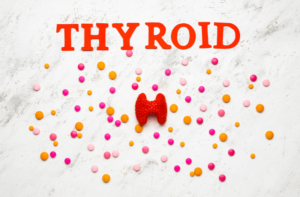Section 7b: Endocrine – Hypothyroid

Anatomy and Physiology
The thyroid gland, a vital component of the endocrine system, produces hormones crucial for regulating metabolism. The primary hormones, thyroxine (T4) and triiodothyronine (T3), influence various physiological processes. The release of these hormones is governed by the thyroid-stimulating hormone (TSH) produced by the pituitary gland.
Importance to Overall Health
Hypothyroidism, characterized by an underactive thyroid, results in reduced production of thyroid hormones. This can lead to a slowdown in metabolism, weight gain, fatigue, and sensitivity to cold. Identifying and addressing hypothyroidism is vital for preventing complications and supporting overall hormonal balance.
Dysfunction
Hypothyroidism can result from conditions like Hashimoto’s thyroiditis, iodine deficiency, or certain medications. Symptoms may include fatigue, weight gain, dry skin, and cold intolerance. Untreated hypothyroidism can lead to complications such as cardiovascular issues and impaired cognitive function.
Nutritional Component
The nutritional biochemistry of the hypothyroid endocrine system involves understanding the regulation of thyroid hormones, specifically thyroxine (T4) and triiodothyronine (T3). These hormones play a crucial role in metabolism, energy production, and overall cellular function.
- Iodine Utilization: Iodine is a critical component in the synthesis of thyroid hormones. The thyroid gland incorporates iodine from the bloodstream into the structure of T3 and T4.
- Thyroid Hormone Synthesis: Thyroid hormones are produced through enzymatic reactions in the thyroid follicular cells. Tyrosine, an amino acid obtained from dietary protein, is essential for this process.
- Conversion of T4 to T3: While T4 is the primary hormone produced by the thyroid, it needs to be converted to the more active T3 form in peripheral tissues. Nutritional factors influence the enzymatic processes involved in this conversion.
Science Behind Nutritional Influence: Nutrients and dietary choices significantly impact the nutritional biochemistry of the hypothyroid endocrine system:
- Iodine: Essential for thyroid hormone synthesis, adequate but not excessive iodine intake is crucial. Iodine-rich foods include seaweed, dairy, and fish.
- Selenium: Plays a role in the conversion of T4 to T3, supporting optimal thyroid function. Brazil nuts and seafood are good sources of selenium.
- Vitamin B12: Essential for overall energy metabolism, vitamin B12 supports thyroid health. Sources include meat, dairy, and fortified foods.
- Zinc: Supports thyroid function and may enhance the conversion of thyroid hormones. Dietary sources include meat, seeds, and nuts.
- Iron: Crucial for individuals with hypothyroidism and coexisting iron deficiency. Good sources of iron include lean meats, legumes, and dark leafy greens.
Supplements
Explore the potential benefits of glandular supplements tailored to your individual health profile by setting up a free 10 minute call with Dr. Kneessi. Otherwise here are some of the most common supplement recommendations for supporting this system. The same 5 nutrients discussed above are the most commonly recommended supplements.
- Iodine: Important for thyroid hormone synthesis, but supplementation should be approached with caution and under guidance.
- Selenium: Supports thyroid function and helps convert thyroid hormones.
- Vitamin B12: Essential for overall energy metabolism and thyroid health.
- Zinc: Supports thyroid function and immune health.
- Iron: Crucial for individuals with hypothyroidism and coexisting iron deficiency.
These supplements are chosen to provide support for individuals with an underactive thyroid. However, it’s crucial to consult with a healthcare professional, particularly for those with thyroid disorders or taking medications, to ensure the supplements are suitable for individual health needs and do not interfere with prescribed treatments.




